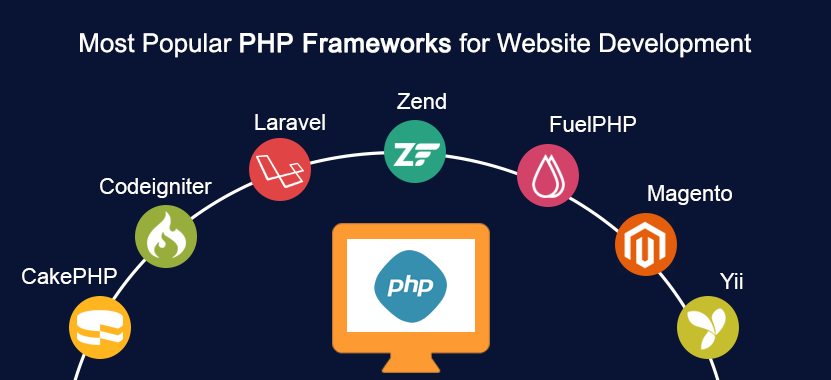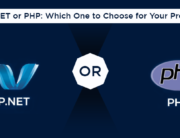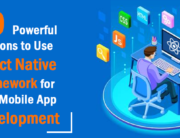Are you planning to get created a dynamic and complex website for your business from a professional website developer? Then you should be aware of which programming language, methodologies, tools and frameworks he will employ for developing your website in a quality and efficient manner.
Your developer is likely to use PHP which is an open-source server-side scripting language for developing your website. This language holds many advantages over other programming languages and is popularly used by developers for creating dynamic websites and web applications. With the majority of websites world over built in PHP proves this language’s popularity and dominant position.
Apart from PHP, your developer is also going to use a PHP framework for developing your website. This framework provides a basic structure for the streamlined development of web apps. Its use enables developers to quicken up the development process by saving a lot of their time and by letting them avoid creating repetitive code. There are many PHP frameworks available which have their specific strengths and weaknesses. So it can be difficult for you to select one which is ideal for the web development of your website.
We are hereby sharing with you 5 top, extremely popular and useful PHP frameworks along with their features. This will make it easy for you to choose the most appropriate framework for your website development project.
1. Laravel

Laravel is the most popular PHP framework. Free and open-source, it was released in 2011. Its ability to manage complex web applications securely and faster than other frameworks has contributed to its popularity. Laravel makes common tasks like sessions, routing, authentication and caching easy, which consequently simplifies the development process.
Laravel features the MVC architectural pattern. The framework is perfect for developing small or large high-end web applications with complex backend requirements. It can seamlessly connect to backend. Homestead, which is a prepackaged box, has made it easy to install Laravel. This framework is compatible with other third-party platforms and libraries. Laravel has a better packaging system which includes a great dependency manager.
Main Features
Laravel is a feature-rich PHP framework. It has got various useful features like security, seamless data migration, view template engine, etc., which help developers in customizing complex apps.
Laravel is immensely flexible and expressive. Its speed and security are as per the expectations of businesses that want a modern web application. Laravel is extremely suitable for developers desirous of building B2B or enterprise websites that will change with altering web trends.
2. CodeIgniter

Just 2 MB in size, including the documentation makes CodeIgniter a lightweight framework. Released in 2006, it is ideal for building dynamic, complex, sophisticated and precise websites and web applications. This framework offers many prebuilt modules that facilitate the construction of powerful and reusable components. Unlike other PHP frameworks, CodeIgniter can be installed and downloaded with ease. Its simple setup process and immensely illustrated documentation make it suitable for newbie developers.
Different components of CodeIgniter enable developers to manage specific development tasks.
The framework is compatible with different hosting platforms. It also allows developers to add easily third-party plugins for performing complicated functions.
Main Features
Due to its ability to start quickly, CodeIgniter provides enhanced performance. The framework has a model-view-controller architecture. Lightweight applications that run on modest servers can also be built with it. CodeIgniter can also be used for building scalable, feature-rich and fully functional apps. Inbuilt security tools and excellent error handling and documentation are the other key features of this PHP framework.
The only problem with CodeIgniter is that its releases are not regular. So it is not suitable for the applications needing higher security.
Also Read : Relevance of Rich Snippets for eCommerce Websites
3. CakePHP

Released in the early 2000s, CakePHP is an open-source PHP framework which is based on the model-view-controller design pattern. It is a simple and elegant toolkit which helps developers create visually effective and feature-rich websites. CakePHP is tremendously popular among developers. Its CRUD or create, read, update and delete framework makes it easy to learn. Also, it is simple and easily installable with just a web server and the framework’s copy. Later, improvements were made in CakePHP. Many new components and features were introduced in it and its performance was enhanced.
Various security features in CakePHP like input validation, cross-site request forgery or CSRF, SQL injection prevention and cross-site scripting or XSS protection make it ideal for commercial applications.
CakePHP enables developers to easily develop web applications in a fast and organized way. It has easily understandable and thorough guidelines. CakePHP provides a simple and efficient coding platform for building applications in a secure manner. Its use helps to save costs in project development. Its rapid development features help to enhance productivity, thus leading to saving of time. CakePHP has got flexible development standards.
Main Features
A modern framework, proper class inheritance, fast builds, security and validation are some key features of CakePHP. Apart from them, it also has got exceptional documentation which enables simple and secure coding. It provides many support portals. Users can also avail premium support through the Cake Development Corporation.
Want to build a professional website that can take your business to the next level? Hire PHP developers from Matrid Technologies, a topnotch software development company with an impeccable reputation. CONTACT US TODAY!!
4. Phalcon

Phalcon is a full-stack PHP framework which makes use of the MVC architecture design pattern. Launched in 2012, it was originally written in the C programming language. As the framework is delivered as a C-extension, developers need not learn the C language to use it.
Phalcon can be easily installed and is perfect for developing immensely configurable web applications in accordance with the enterprise development guidelines. Because of the efficient utilization of its memory, it gives an optimized performance. So the framework is ideal for building fast websites.
The loosely coupled nature of Phalcon allows developers to either use it wholly or use its particular parts as glue components. Also, they can further download the framework and install it as a PHP module.
Its ease of learning has contributed in making this framework extremely popular among PHP developers in a short amount of time.
Main Features
Increased execution speed, a universal autoloader, management of assets, great performance, enhanced security and caching are some key features of Phalcon. It also provides some other important features like routing, ORM, templates, controllers, query language, etc. Phalcon also allows developers to use only those modules and libraries which are required by them.
The only downside of Phalcon is that its developers are somewhat slow in patching bugs, so it is not suitable for modern web applications requiring increased security.
5. Symfony

It is a full-stack framework which allows developers to do things in their desired way. Released in 2005, Symfony is specifically designed for advanced developers. Though it has been around for more time than the other frameworks mentioned here, it is a mature and trusted platform.
Symfony is a large PHP MVC framework. It is the sole framework that follows PHP and web standards. It is ideal for developing big-scale enterprise projects. Symfony can be easily installed and configured on the majority of platforms. It facilitates fast development of web applications. It grants full control over an architecture.
This PHP framework is stable. It is compliant with most of the best web practices and design patterns. Symfony can be integrated with libraries from other vendors. It has a large ecosystem and many reusable components. It is feature-rich and allows developers to do everything, which make it bloated and slow-performing than other frameworks. Its components enable app developers to finish different tasks, including configuring and creating objects, templating, authentication and routing besides others.
Symfony is immensely flexible and has the ability to integrate and power up large projects like Drupal, Laravel, PHPBB, OroCRM and Piwik. Symfony and Laravel contain many unique and common features. So it is difficult to decide which one of them is better. Laravel emphasizes on simplicity and providing value, even for newbie developers, while Symfony is for skilled developers and is somewhat hard to begin working with. Also, its security mechanism is somewhat difficult to use.
Main Features
Reusable PHP components and database engine-independence are some of its prominent features. Bundles are another important feature of it which help to considerably quicken up development.
Yii, Zend Framework, FuelPHP, PHPixie, Slim and Aura are some other PHP frameworks which also deserve a place in the list of the top, most popular and immensely useful PHP frameworks.
After knowing about the various leading PHP frameworks and their features, strengths and weaknesses, it would become easy for you to decide which among them is the most suitable for your website or web application development project.








Leave A Comment